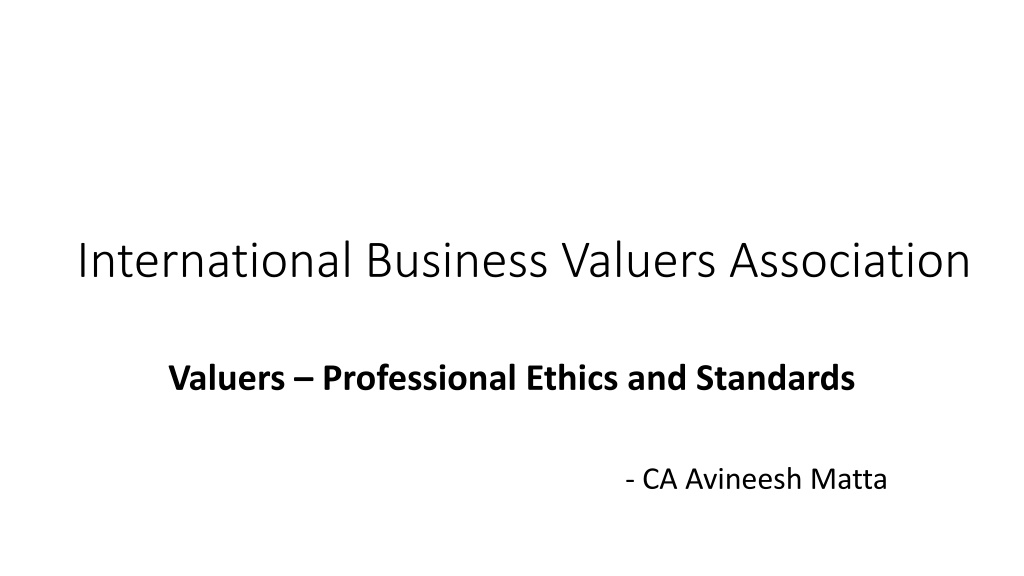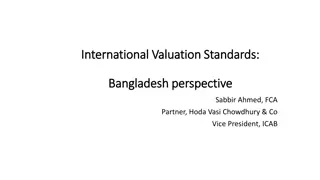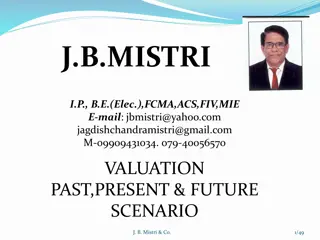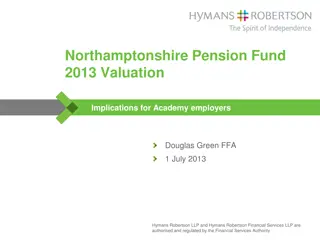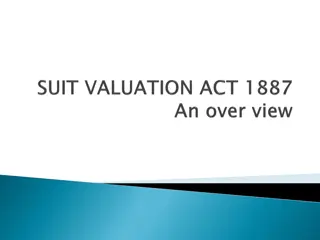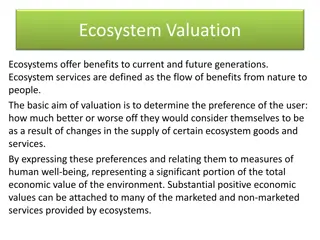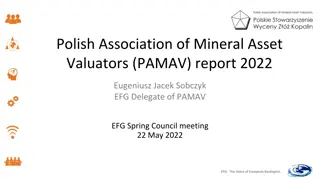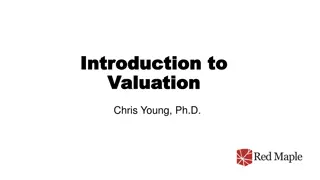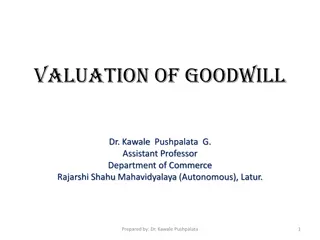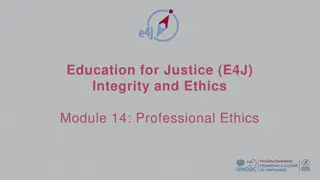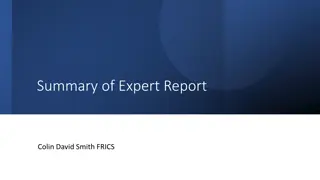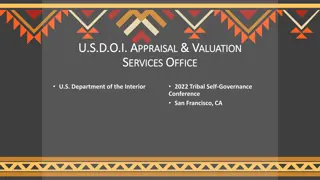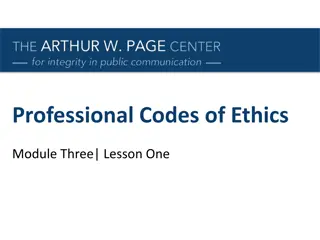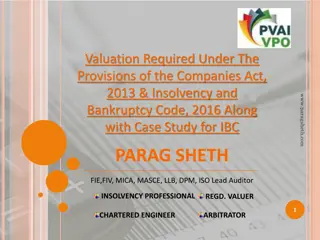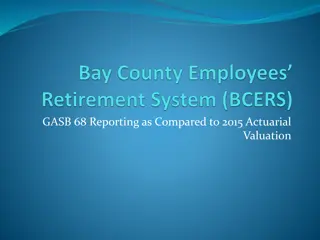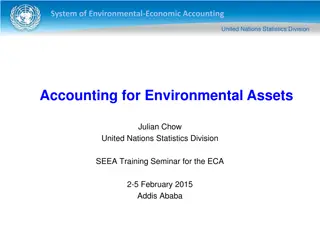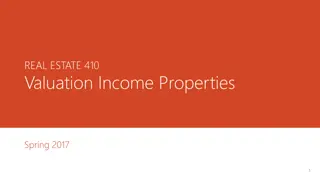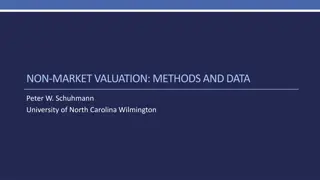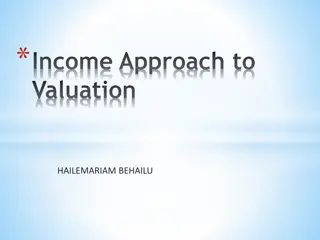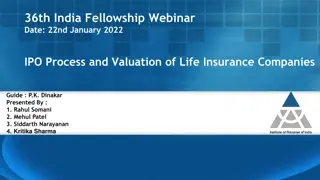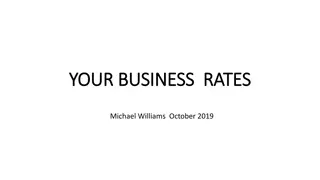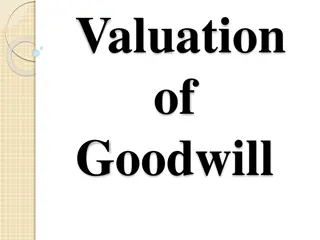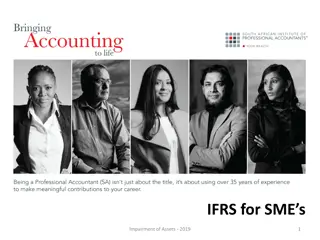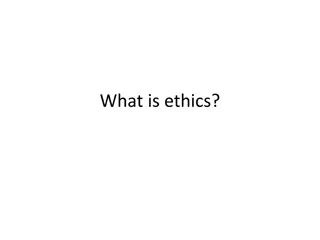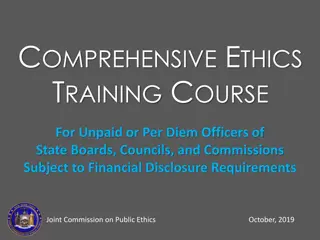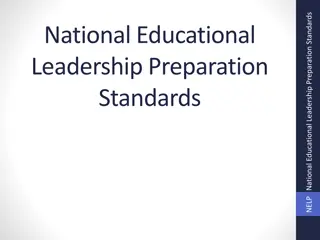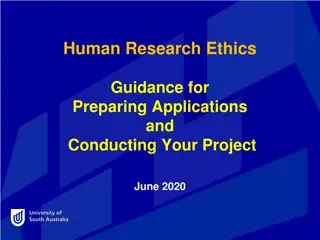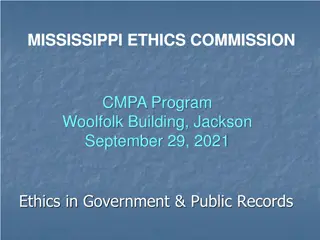Professional Ethics and Standards in Valuation: A Comprehensive Overview
Explore the International Business Valuers Association's guidelines on professional ethics, standards, and the role of valuers in society. Learn about the code of conduct, ethical considerations in valuation, evolution of the profession, and the important role valuers play in providing authentic and unbiased valuations for decision-making.
Download Presentation

Please find below an Image/Link to download the presentation.
The content on the website is provided AS IS for your information and personal use only. It may not be sold, licensed, or shared on other websites without obtaining consent from the author. Download presentation by click this link. If you encounter any issues during the download, it is possible that the publisher has removed the file from their server.
E N D
Presentation Transcript
International Business Valuers Association Valuers Professional Ethics and Standards - CA Avineesh Matta
Learning Objectives - What & Why of us? - Role of Professional valuers - Entry in profession & Remaining Relevant? - Competency framework - How to conduct ourselves? - Code of ethical principles for professional valuers - Following Valuation Standards
Curriculum 1 - Code of Conduct for Valuers Model Code of Conduct under the Companies (Registered Valuers and Valuation) Rules, 2017 - professional competence and due care, independence and disclosure of interest, confidentiality, information management, gifts and hospitality, Integrity and fairness, remuneration and costs, occupation, employability and restrictions, business ethics 2 - Conduct of Valuation Ethical considerations under terms of engagements - engagement letter, management representation, guidance on use of work of experts, independence and conflict of interest, quality review process of valuers, rights and responsibilities of valuers
Evolution & Development Early days Institution of Surveyors came up in 1950 with the primary objective of advancing and regulating the various disciplines of surveying. Licentiates under Insurance Act, Chartered Engineers Institution of Valuers , which came up in 1968, is probably the first VPO in the country and probably the largest one. Incorporated by the Royal Charter in 1881, Royal Institution of Chartered Surveyors (RICS) is probably the oldest, largest and most respected professional body for valuation. From informal to formal Sec. 247 of CA 2013 & The Companies (Registered Valuers and Valuation) Rules 2017 Self regulation to co-regulation Standardization IVS, Red Book, Indianized
Evolution - Regulating the Profession & Professional Protection of interests of professionals in initial days Development of Profession Regulating the Profession Protection of the Interests of users of professional services
Role of Professional valuers Service to society Authentic valuations to serve as reference for evaluation of choices and decision making , ( Sukhasya mulam Dharma; Dharmasya mulam artha) - Chankya The basis of happiness is righteousness (loosely translated), the basis of righteousness is wealth. Right to practise a profession carries a duty to protect the interest of society and is not a privilege for the benefit of the professional Unbiased, Independent and Objective Valuations
Segments Immoveable Property Land & Building Agriculture Land Plantations Forest Mines & Quarries Plant & Machinery Jewellery Work of Art Life interest, reversions and interest in expectancy - Actuary Financial Assets & Securities Business Interest & Business Intangible Assets Financial Liabilities
Statutory Role Valuation Services Required under Various Enactments The Banking Regulations Act, 1949 The Income Tax Act, 1961 The SARFAESI Act, 2002 The Limited Liability Partnership Act, 2008 The Foreign Exchange Management Act, 1999 The Black Money (Undisclosed Foreign Income and Assets) and Imposition of Tax Act, 2015 The Securities and Exchange Board of India Act, 1992 The Companies Act, 2013 The Insolvency and Bankruptcy Code, 2016
The Companies Act, 2013 Issue of further shares and securities by an unlisted company Non-cash transactions between a director and the company Compromise or make arrangements with creditors and members Purchase of minority shareholdings Submission of report by the Company Liquidator in case of winding-up order by NCLT Deposits market value of assets where company accepts deposits which are secured by charge on its assets Issue of sweat equity shares Fair valuation, etc. under IndAS (IFRS)
The Insolvency and Bankruptcy Code, 2016 Corporate Insolvency Resolution Process of a corporate debtor, and Fast Track Insolvency Resolution Process determination of fair value and liquidation value Liquidation of Corporate Person Liquidation value Voluntary liquidation of corporate persons Directors solvency declaration to accompany valuation report Avoidance Transactions Adjudicating Authority may seek valuers report IBBI registered valuers for specific class to provide valuation
Competency Framework The International Valuation Standards Council (IVSC) independent, not-for-profit, private sector organisation to serve the public interest IVSC s objective Build confidence and public trust in the valuation process by creating a framework for the delivery of credible valuation opinions by suitably trained valuation professionals acting in an ethical manner. By: creating and maintaining the International Valuation Standards (IVSs); issuing technical guidance for professional valuers; and promoting the development of the valuation profession and ethical practices globally.
Valuation Professional Organisations e.g., IBVA Valuation Professional Organisations e.g., IBVA In the direction of co-regulation principles responsibility for the training and development of their members responsible for ensuring that their members maintain competence and comply with rules of ethical conduct VPO membership of the IVSC - criteria: not for profit organisation, must set minimum education, competency and ethical standards for their members uphold the public interest over the interests of their members have a system for disciplining members who breach their ethical and other conduct rules have governance and operating structures suitable to their role and responsibilities and be able to demonstrate integrity in the conduct of their activities. Monitoring Policy by RVOs
THE COMPANIES (REGISTERED VALUERSAND VALUATION ) RULES, 2017 Application (Rule 1) (3) These rules shall apply for valuation in respect of any property, stocks, shares, debentures, securities or goodwill or any other assets or net worth of a company or its liabilities under the provision of the Act or these rules. (Act means Companies Act, 2013 r. 2 (a) Explanation It is hereby clarified that conduct of valuation under any other law than the Act or these rules by any person shall not be affected by virtue of coming into effect of these rules Authority - r. 2 (b) to perform functions under these rules IBBI is specified by C.G. u/s 458 of the Act CIRP Regulations Registered Valuer means a person registered as such under the Companies Act, 2013 or the rules framed thereunder.
Demonstrate competence in a role as Valuer Demonstrate that you have professional knowledge, professional skills, and professional values, ethics, and behaviour. How Competencies are gained by Initial Professional Development (IPD) and by Continuing Professional Development (CPD) professional valuer will have undertaken IPD and will be undertaking CPD on a regular basis Rule 4 & 5 Qualification, Experience and Valuation Examination
Rule 7 Conditions of Registration At all times Must possess eligibility and qualification per rule 3 & 4 Comply with provisions of the Act, Byelaws, Regulations of RVO Not to conduct valuations for other than what he is registered for Take adequate steps for redressal of grievance Maintain record of each assignments undertaken for at least three years Comply with Code of Conduct of RVO Partnership (Regd.) & Company as Valuer Partner or director signing must be a Registered Valuer of that asset class Disclose to the concerned company, extent of capital employed or contributed by signing partner Partners to be jointly & severally liable along with the signing partner Rule 3(2)(a) subsidiary, JV or associate of another company or body corporate ineligible
Initial Professional Development Initial Professional Development Formal education and successful examination to the level of a university degree Education on valuation that includes an understanding of economic theory and principles an understanding of financial markets an understanding of recognised valuation concepts and principles the theory and application of valuation methods used in the market in which they intend to operate the legal framework that is relevant to the market in which they intend to operate, knowledge of the technical standards and guidance relevant to the market in which they intend to operate. Training in the Fundamental Principles of ethical conduct as identified in the IVSC Code of Ethical Principles for Professional Valuers. Work experience of 1500 hours over 2 years
Continuing Professional Development Continuing Professional Development A valuer s commitment to a programme of CPD Throughout their period of practice as a valuer which is relevant to their chosen area of practice By a combination of attendance at recognised or approved training events and self-study. A minimum of 50 hours of structured professional development is recommended in any three year period RVOs to have policy for Continuing Education of members
Gandhi on Entrepreneurial Ethics Truthfulness in conduct of business is reflective of image of the Nation. Seven Social Sins: Politics without Principles Wealth without Work Commerce without Morality Knowledge without Character Pleasure without Conscience Science without Humanity Worship without Sacrifice Everything finally belongs to the Society Social Contract
Ethical Dilemmas Many issues seems straight forward and easy to resolve but are not always true Making choices amongst alternatives Questions between right and wrong Bribe or Business promotion Employee retrenchment Loyalty to person, work or organization Conflict between right and right Charity?
Four Way Test Is it TRUTH? Is it FAIR to all concerned? Will it build GOODWILL and BETTER RELATIONSHIPS? Will it be BENEFICIAL to all concerned? Fiduciary Role towards Stakeholders Client Third party Users placing reliance Researchers Society at large
Professional Values, Ethics, and Behaviour Professional Values, Ethics, and Behaviour Character Before entering as member an individual to demonstrate good character & reputation Conduct Commitment to follow ethical principles of IVSC/ RVO Accountability accountable for any failure to comply with the ethical principles of conduct or the competent application of professional knowledge and skills VPO to have grievance redressal for third party complaints of negligence Legal Compliance Comply with the conditions of any statutory system of licensing or other regulatory requirements Rule 10 mandates valuer to conduct valuation as per these rules
Code of Ethical Principles for Professional Valuers - IVSC The Fundamental Principles Integrity of Valuation Process paramount Valuer to have the appropriate experience, skill and judgement Act in a professional manner and Exercise their judgement free from any undue influence or bias The Fundamental Principles Guidance approach that should be taken to applying the Fundamental Principles to identify, evaluate, and address threats to valuer s ability to comply with the Fundamental Principles Appendix 1 Threats and Safeguards Appendix 2 Discussion of Fundamental Principles
The Fundamental Principles Ethical considerations under terms of engagements Integrity straightforward and honest in professional and business relationships Objectivity not to allow conflict of interest, or undue influence or bias to override professional or business judgement Competence maintain the professional knowledge and skill required to ensure that a client or employer receives a service that is based on current developments in practice, legislation, and valuation techniques
Principles.. Confidentiality to respect the confidentiality of information acquired as a result of professional and business relationships not to disclose such information to third parties without proper and specific authority (unless there is a legal or professional right or duty to disclose) not to use information for the personal advantage of the professional valuer or third parties. Professional behaviour to act diligently to produce work in a timely manner in accordance with applicable legal requirements, technical and professional standards Always act in the public interest and to avoid any action that discredits the profession
Fundamental Principles Fundamental Principles Guidance Guidance Identify potential threats in complying with the fundamental principles Evaluate the significance of such threat How such threat may be mitigated or reduced to an acceptable level Accept the assignment with safeguards to see the compliance to the fundamental principles are not compromised, or Else, decline the assignment based on such evaluation
Guidance Unusual circumstances in which application of Code results in disproportionate outcome or Outcome not in public interest Significant conflict not resolved by declining assignment or with safeguards Consider consulting VPO or if appropriate the Regulator Consider obtaining legal advise But Without compromising confidentiality (anonymous basis) Encountering Fraud, reporting results breach of confidentiality Obtain Legal advise If no resolution in sight, resign from assignment, team, firm or employer
Threats Threats Self-interest threat Financial or other influencing judgement or behaviour Self-review threat Evaluating previous assignment or service performed By self, or another valuer from same firm while taking up current assignment Client conflict threat two or more clients may have opposing or conflicting interests in the outcome of a valuation Advocacy threat Promoting client s or employer s position to the point that their objectivity is compromised
Threats Familiarity threat long or close relationship with a client or employer, becoming too sympathetic to their interests or too accepting of their work Intimidation threat A threat to deter acting objectively because of actual or perceived pressures, including attempts to exercise undue influence over the valuation opinion
Safeguards Safeguards Safeguards contained in statutes or regulations relating to the purpose for which the valuation is undertaken corporate structure and governance of valuation services firms statutory licensing of valuers regulations on the educational, training and experience requirements external review by a legally empowered third party of valuations, reports or other information produced by valuation professional
Safeguards Safeguards contained in rules of conduct issued by a Valuation Professional Organisation to which the professional valuer belongs requirements to comply with professional standards monitoring of compliance with professional standards and disciplinary procedures rules on the basis of remuneration for valuation assignments.
Safeguards Safeguards contained in a firm s internal working procedures and quality controls. Segregating valuers and other team inter se, with conflicting roles Registers of material personal interests of valuers and other staff Internal Peers Review processes Periodical rotation of professional valuer in recurring assignments Controls on acceptance of gifts or hospitality from clients or associates Disclosure safeguarding policies to the clients Deterring & Preventing unethical behaviour Third party complaint services (Hotline, etc. for whistleblowing) Mandatory reporting by a professional to report breach of ethical requirements
Application Guidance on Principles Integrity Straight forwardness, honest in dealings, fair dealing and truthfulness Not associate knowingly with a report, opinion, information containing materially false or misleading elements or made recklessly Omits or obscures information required to be included, where such omission results in misleading Becoming aware of such misleading information, act immediately to take remedial measures and disassociate with such information Issuing modifying opinion or report
Objectivity Objectivity Obligation not to compromise professional or business judgement because of bias, conflict of interest or the undue influence of others If threats are incapable to avoid or mitigate, decline the assignment Disclose the threats to relevant parties and obtain consent Situations that could potentially impose a threat requests to produce valuations for the buyer and the seller of an asset in a transaction requests to produce valuations for two or more parties competing for an opportunity requests to value for a lender where advice is also being provided to the borrower undertaking a valuation for third-party consumption where the professional valuer s firm has other substantial fee-earning relationships with the commissioning client providing recurring valuations of the same asset unless controls are in place to minimize the risk of self-review requests for a professional valuer to act as an advocate and as an expert in relation to the same matter.
Objectivity and Perception of Bias Previous engagement may actually enhance ability to provide objective opinion Disclosure is effective in dispelling bias Minimizing perception of bias Ensuring separation of valuer and other department providing potentially conflicting services within the same firm Rotation of professional, periodically Disclosure should not impeach confidentiality, if same asset valued for some other party
Competence Competence Appropriate knowledge and skill to provide services with applicable standards and contemporary professional environment Attainment & Maintenance of professional competence, in continuum Diligently and responsibly to act with requirements of assignment, carefully, thoroughly and on timely basis Professionals working under have apt training and supervision Decline assignment, if does not possess requisite knowledge, skill and experience to handle a particular assignment
Confidentiality Confidentiality Refraining disclosure to outsiders without proper and specific authority or under a legal or professional right Not to use information for private gain Be alert to the possibility of inadvertent disclosure including to close family member Required even for the information obtained from the prospective client or employer Necessary even within the firm or employing organization, and by his Staff Maintain even after end of assignment at all times to come
Disclosure of confidential information Permitted by law and is authorized by the client or the employer Production of documents as evidence in legal proceedings To public authorities where infringement of law comes to light Professional duty or right to disclose, when not prohibited by law To comply with Quality Review by VPO or other professional body Responding to query or investigation by VPO To protect professional interest of a valuer in legal proceeding To comply with technical standards and ethical requirements Carefully consider the third party interest to be affected, type of communication expected and apt recipients
Professional behaviour Professional behaviour Obligation on valuers to act diligently to ensure service provided is in accordance with all legal, technical and professional standards as applicable to the subject and purpose or both Acting in public interest Opinion may have wider impact on unidentified third parties Stockholders or investors in a fund Not to accept any instruction from the client which appears to prejudicial to public interest or discredit own reputation or of the profession While marketing themselves and their work, not to bring disrepute No exaggerated claims of qualifications, work, attainment, etc.
Model Code of Conduct for Registered Valuers Integrity and Fairness Professional Competence & Due Care Independence & Disclosure of Interest Confidentiality Information Management Gifts & Hospitality Remuneration & Costs Occupation, employability and restrictions
Integrity and Fairness Follow high standards of integrity & fairness while dealing with clients & other valuers Straightforward, honest and forthright in professional and business relationships Endeavor to ensure to provide true & adequate information Not to misrepresent any facts or situations Refrain from any inaction that would bring disrepute to the profession To keep public interest foremost while delivering service
Professional Competence & Due Care High standards of service, exercise due diligence, ensure proper care Exercise Independent professional judgment Carry out services in accordance with relevant technical & professional standards Continuously maintain professional knowledge & skills based on up-to-date developments in practice, prevailing guidelines and regulations In Valuation Report, not to disclaim liability for his expertise & duty of care Reliance on statement of facts provided by company, its auditors, its consultants or information in public domain permissible Not to follow client s instructions if, incompatible with integrity, objectivity and independence Clearly state to the client, his competence of services to be provided by him or relying on the services of other professionals Client can have separate arrangements with such other professional
Independence & Disclosure of Interest Act with objectivity in professional dealing No biases, conflict of interest, coercion, undue influence of any party Not to take up assignment if he or any of his relatives is not independent in terms his association with the company Must maintain complete independence and complete assignment independent of external influences Wherever necessary disclose possible sources of conflict of duties & interests Not to deal with securities of subject company after becomes aware of potential valuation assignment - per SEBI (Insider Trading) Regulations Not to indulge in mandate snatching or offering convenient valuations Not to charge success fee Declare association with the company, in last 5 years of prior unconnected transaction
Confidentiality Not to use or divulge to any client or any other party any confidential information, except With proper and specific authority Under legal or professional right or duty to disclose
Information Management Maintain written contemporaneous records for decisions taken With reasons, information & evidence in support Sufficient to enable a reasonable person to take a view on its aptness Inspection & Investigation by the authority (IBBI), RVO, other statutory regulatory body Appear, cooperate & be available Provide information and Records to IBBI, Tribunal, Appellate Tribunal, RVO, or other statutory authority Maintain proper working papers For at least 3 years or such longer period per contract or till disposal of case Present before statutory authority & for peer review
Gifts & Hospitality Valuer of his relative shall not accept gifts or hospitality with undermines his independence Relative per s. 2(77) of Companies Act 2013 Not to offer gifts or hospitality or a financial or other advantage To a public servant or other person To obtain or retain work for self, or To obtain or retain an advantage in the conduct of profession for himself
Remuneration & Costs Valuer to provide services for remuneration charged In transparent manner Is reflection of work necessarily and properly undertaken Should not be inconsistent with the applicable laws Valuer not to accept any fee or charges other than those disclosed in a written contract with the client
Occupation, employability and restrictions Valuer to refrain from accepting too many assignments, unless He is able to devote adequate time to each Not to conduct business which in the opinion of authority (IBBI) or RVO discredits the profession
Conduct of Valuation Rule 8 RV to comply with Valuation Standards as notified under rule 18 In the interregnum To follow internationally accepted valuation standards Standards adopted by any RVO RV may obtain inputs for other class of assets from another RV and to disclose such details of inputs with details of other RV Liabilities against the valuation remains with the first mentioned valuer
Valuation Report (Rule 8 (3)) background information of the asset being valued purpose of valuation and appointing authority identity of the valuer and any other experts involved in the valuation disclosure of valuer interest or conflict, if any date of appointment, valuation date and date of report inspections and/or investigations undertaken nature and sources of the information used or relied upon procedures adopted in carrying out the valuation and valuation standards followed restrictions on use of the report, if any major factors that were taken into account during the valuation conclusion caveats, limitations and disclaimers to the extent they explain or elucidate the limitations faced by valuer, which shall not be for the purpose of limiting his responsibility for the valuation report
Engagement Letter Need Terms of engagement A valuer must ensure that the intended recipient(s) of the valuation advice understand(s) what is to be provided and any limitations on its use before it is finalised and reported. Contents Scope of work, must be shared prior to completion Identity of valuer, client, intended user, subject asset, valuation currency, purposes, bases & premise of value, valuation date, nature of limitations if any, sources of information, restriction on distribution, legal framework and standards to be applied, Type of report (Complete Report, Review or Calculation engagement) Terms of payments Timelines Responsibility of client & the valuer ownership of working papers Third party expert or external valuer to be involved and terms thereof Confidentiality obligations of client & valuer Change in scope in writing
